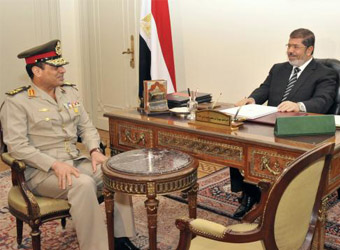Egypt’s President Mohamed Morsi has rejected an army ultimatum to force a resolution to the country’s political crisis, saying on Tuesday that he had not been consulted and would pursue his own plans for national reconciliation.
The Islamist leader described as potentially confusing the 48-hour deadline set by the head of the armed forces on Monday for him to agree on a common platform with liberal rivals who have drawn millions into the streets demanding his resignation.
The statement issued by the army said it would have to intervene if the political crisis was not resolved.
The warning of military intervention came after vast crowds of Egyptians took to the streets on Sunday demanding the resignation of Mr Morsi.
Members of Mr Morsi’s Muslim Brotherhood have used the word “coup” to describe the military’s manoeuvre, which carries the threat of the generals imposing their own road map for the nation.
But in a statement issued at about 2am on Tuesday, nine hours after General Abdel Fattah al-Sisi delighted Mr Morsi’s opponents by effectively ordering the president to heed the demands of demonstrators, the president’s office used considerably less direct language to indicate he would try to take little notice.
“The president of the republic was not consulted about the statement issued by the armed forces,” it said. “The presidency sees that some of the statements in it carry meanings that could cause confusion in the complex national environment.”
After hearing the news of the military’s comments on Monday, protesters in Tahrir Square erupted in joy. In an extraordinary scene, army helicopters bearing Egyptian and military flags circled around the crowds, eliciting howls of delight.
But the return of the military to politics, even as an arbiter, underlines the precariousness of Egypt’s nascent democratic order. The army helped remove Hosni Mubarak, the former president, in 2011 but quickly lost public support as it mishandled the transition.
In a statement read on television, the military said it was giving political forces a “last chance” to reach an agreement or it would have to “impose a road map for the future” and ensure its implementation “with the participation of all sides”.
Though the army statement said the institution had no wish to play a role in politics or government, its re-emergence as a force willing to issue warnings to the elected president undermines Mr Morsi’s position and will infuriate some of his supporters.
In a second statement a few hours later, the army denied that its move amounted to a military coup, and said it only intended to push politicians to reach a consensus.
Khaled Abdel Hameed, a leftwing opposition activist, said the message from the military was that “if the Islamists wanted to retain a role in politics they had to accept a reordering of the political scene and relinquish their claim to primacy based on Mr Morsi’s electoral win”.
But Mohamed El Beltagy a senior official of the Muslim Brotherhood was quoted on the group’s website as saying that “any coup against legitimacy will only stand over our dead bodies”.
By nightfall, thousands of Brotherhood supporters had started staging rallies around the country denouncing the intervention by the military. The group’s television channel broadcast footage from demonstrations in Cairo and elsewhere in which protesters chanted that Egypt would remain “Islamic” despite the liberals, secularists and Christians.
An alliance of Islamist groups supporting Mr Morsi has called for Egyptians to come out in protests “in all the squares of Egypt” to defend the elected president.
Gen al-Sisi warned last week the army might be forced to step in to prevent a slide into chaos, as the opposition called for mass rallies and some in the Islamist camp threatened violence.
“The armed forces are reiterating their invitation [to political forces] to meet the demands of the people and are giving everyone 48 hours as a last chance to shoulder the responsibilities of this historic moment,” said the statement on Monday.
The army statement praised Sunday’s protests saying the people had “come out in complete freedom displaying insistence and determination in a dazzling manner which sparked admiration locally, regionally and internationally”.
The protests against Mr Morsi have been driven by a loose coalition of youth activists, secular and liberal politicians and elements of the ousted Mubarak regime trying to capitalise on the discontent. While they have managed to put millions on the streets, their competing agendas are likely to make a compromise with Mr Morsi very difficult.
Since the 2011 revolution, Egyptian society and politics have suffered from a deep rift between Islamists and their opponents which has bedevilled attempts to reach a national consensus.
Mr Morsi was elected by a slim majority a year ago, and his critics say he has exacerbated the rifts in society with his bid to control the state. State institutions riddled with the hostile influence of the former regime have opposed his agenda, as has a large section of society which mistrusts the intentions of his conservative Muslim Brotherhood group.
In recent weeks, as Mr Morsi drew closer to hardliners and former jihadis who described the opposition as infidels and threatened to crush them, some have feared the country was drifting towards civil war.
The army’s intervention may have temporarily reduced the potential for violence but analysts warn that it could provoke a backlash from aggrieved Islamists.
Khalil al-Anani, a political analyst, said that if the army forced Mr Morsi to step down it would be taken by many Islamists as not just a coup against an elected president but as a move against the “Islamist project”.
“It could push some into violence and we could witness clashes between Islamists and non-Islamists or between Islamists and the army,” he said.
Source: Financial Times



